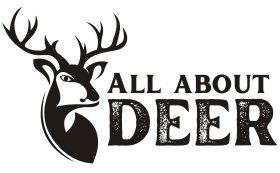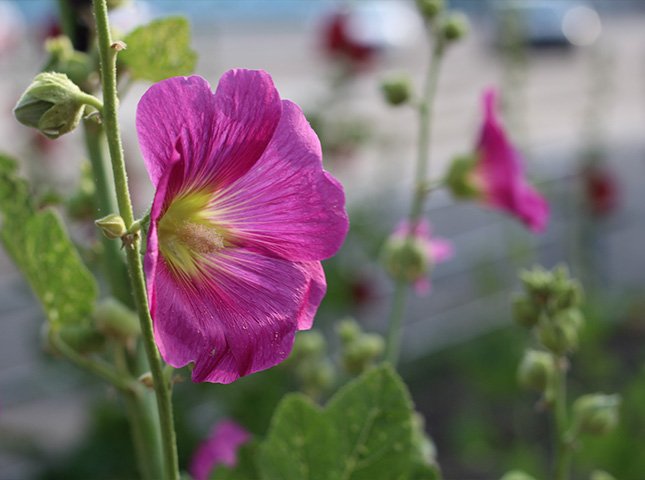Deer and hollyhocks – an odd pair! We wonder if they have a liking for the bright blooms?
Deer are known for eating a variety of plants, but do they like hollyhocks? Let’s explore this mystery!
Hollyhocks, they have tall stems and pretty flowers, sprucing up any garden. They belong to the mallow family and are quite fragile.
Deer are known for grazing on foliage – their preferences vary from region to region. Hollyhocks don’t have thorns or strong scents, but that doesn’t make them a top pick for deer.
Table of Contents
What are hollyhocks
Hollyhocks, also known as Alcea rosea, are majestic flowering plants from the mallow family. These tall perennials come in a range of colors, such as pink, purple, yellow, and white. Native to southwestern Asia and the eastern Mediterranean region, hollyhocks are now grown around the world for their beauty.
These plants have erect stems and columnar blooms that reach up to 7 feet high! Plus, their rough-textured leaves provide a nice contrast to the smooth petals. Hollyhocks have more than just good looks, though. Their nectar-rich flowers attract bees and butterflies, and they have medicinal uses due to their high mucilage content.
Herbivores, however, may not be as fond of these flowers. Deer, for instance, tend to avoid hollyhocks because of their alkaloid content, which can be toxic or unpalatable. So if you’re looking for deer-resistant plants, hollyhocks may be your best bet.
Do deer eat hollyhocks
To understand if deer eat hollyhocks, explore why deer are attracted to these plants. Discover the sub-section “Why deer are attracted to hollyhocks” to gain insights into the factors that draw deer towards hollyhocks.
Why deer are attracted to hollyhocks
Deer are captivated by the beauty of hollyhocks! Their succulent leaves and delicate petals provide a delectable treat. Grazing on hollyhocks, deer find nourishment and solace in the lushness and fullness of these towering plants. Additionally, their vibrant colors and sweet scent draw deer in from afar.
Protecting hollyhocks from deer
To protect your hollyhocks from deer, employ effective strategies. Fencing as a deterrent, using deer repellents, and planting deer-resistant alternatives offer viable solutions. These sub-sections will cover different approaches to safeguarding your cherished hollyhocks from the potential threat of deer.
Fencing as a deterrent
Fencing can be a great tool for protecting hollyhocks from deer. Here are 5 tips for using it:
- Make sure the fence is 6 feet tall and solid (no openings).
- Bury 12 inches of it in the ground.
- Check for damages or weak spots, and fix them quickly.
- Motion-sensor lights or sprinklers may help.
- Fencing won’t stop all deer – combine it with repellents and thorny bushes.
Using deer repellents
Spray repellents contain garlic, peppermint, or hot peppers and create a bad smell or taste to keep deer away from your hollyhocks. Granular repellents are spread on the soil and release a scent that deer don’t like. Electronic repellents make uncomfortable noises that scare off deer. Fences 8 feet tall and buried a few inches deep stop deer from entering. Lavender, sage, and yarrow plants have strong smells and textures that deter deer.
Rotate repellent types, check for damage, and combine methods for the best protection. This way, you can keep deer away while your garden looks amazing!
Planting deer-resistant alternatives
Lavender, Rosemary, Salvia, Catmint, and Ferns are excellent choices for keeping deer away from your garden. Alliums and Daffodils also provide a great additional layer of protection. These plants repel deer with their strong scent and taste. Planting them near your hollyhocks can ensure the beauty and safety of your flowers.
Conclusion
Deer have a voracious appetite for plants. But, do they dine on hollyhocks? It turns out that these majestic creatures don’t usually enjoy munching on these tall garden beauties. They will nibble on many other plants, but hollyhocks are off their menu.
However, in rare cases of extreme hunger or lack of other food sources, deer may sample these lovely flowers. Generally speaking, though, hollyhocks are safe from the deer’s snacking habits.
Why do deer avoid hollyhocks? It’s because of their sensitive mouths. The leaves of hollyhocks possess tiny hairs called trichomes. These act as a natural defense against grazing animals. This makes them less appealing and digestible for deer.
Last summer, I witnessed a rare event. I saw a doe delicately eating the leaves of my hollyhock plant. I was amazed and quickly grabbed my camera to capture the moment. It shows that, even in the world of nature with its patterns, surprises can still happen when it comes to dining preferences.
Frequently Asked Questions
Q: Do deer eat hollyhocks?
A: Yes, deer often eat hollyhocks. They consider hollyhocks as a tasty treat, especially during the winter when food is scarce.
Q: Are hollyhocks toxic to deer?
A: No, hollyhocks are not toxic to deer. While some plants may be poisonous to deer, hollyhocks are not harmful to them.
Q: How can I protect my hollyhocks from deer?
A: You can protect your hollyhocks from deer by using physical barriers such as fences or netting. Additionally, applying deer repellents or using scent deterrents can help keep the deer away.
Q: Are there deer-resistant varieties of hollyhocks?
A: Yes, there are some hollyhock varieties that are known to be less attractive to deer. These include the ‘Nigra’ and ‘Pinafore Pink’ varieties. However, it’s important to note that no plant is completely deer-proof.
Q: How do I deter deer from eating my hollyhocks without using chemicals?
A: You can try using natural deterrents to keep deer away from your hollyhocks. Planting deer-resistant plants nearby, using strong-scented herbs like lavender or rosemary, and creating noise or motion with wind chimes or scare devices can be effective methods.
Q: Can I feed deer with hollyhocks?
A: While deer may eat hollyhocks naturally, it is not recommended to intentionally feed them hollyhocks or any other human-grown plants. Feeding deer can disrupt their natural diet and behavior, leading to negative consequences for both the animals and the environment.


